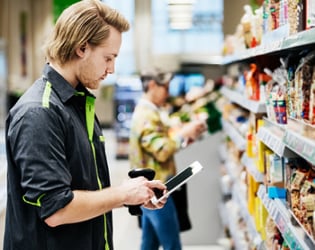Why is it when we are surrounded with so much choice we can find it hard to make decisions?
In my mother’s day she shopped locally and had a personal relationship with the grocer, butcher, and fruiterer. These businesses were all part of her local community and knew her name, her likes and dislikes. They gave her suggestions of what was good to buy, what was on special. They tailored their recommendations to the needs of her family. Information on what to buy, what was in season, and what was a good deal was generally by ‘word of mouth’.
Then came the 60’s and 70’s, and the advent of massive TV advertising, Shopping Malls and - to a large degree - the de-personalisation many facets of our everyday lives. So, for the last 40 years, we have been living in a world of ever increasing mass marketing with multiple choices, multiple brands, multiple offers and features.
The noise from product marketing through all forms of media has made us consumers get better at ignoring product pitches, no matter how they are presented. In some cases companies are wasting marketing budgets in getting products noticed and ultimately sold. We just don’t have the time to assess all the offers presented… and so cracks have been developing in the existing tried and tested marketing approaches.
Now savvy companies are starting to wake up. The focus pendulum is swinging from mass marketing back to personalisation. With prizes like a better bang for marketing dollar and a reduction in the number of ignored offers, you don’t need to be Einstein to understand why.
It’s no secret we as humans like to be listened to. Many of us like to wear clothes, drive cars, furnish and paint our home that distinguish us from the other 7 billion people on planet Earth.
Amazon have embraced this concept. They reap the rewards of personalising their massive book title range based on our past buying habits every day. Even McDonalds - one of the greatest mass marketers - now promotes us to ‘build, scan, and enjoy the burger of our dreams’.
So it is with B2B eCommerce. Have you have experienced the frustration of having drilled down multiple levels of categorisation during a product search only to be presented with a plethora of products, likely all with similar features and functions?
It has become a world of too much data and not enough relevant information for what we need to go about our daily jobs and life.
So, without personalisation, as regular eCommerce users we get inundated with content that bears little relevance to what we are researching and ultimately want to buy. This inundation is a huge turn off and, in many cases, drives us to abandon sites and potentially churn as a customer.
So the question is: ’if you are not personalising your marketing what is it doing to your business?’
If you focus on your website and eCommerce, the obvious ones are reduced conversions, and increased customer churn. There are others that will mount up over time. These include:
- reduced order value – the customer just couldn’t find all the goods they were looking for
- reduced time on the site – which, when you consider this is where customers are doing over 70% of their research before contacting you over multiple channels, is a big risk
- reduced efficiency in targeted offers – getting to the right people with the right offers
- and a lead on from reduced efficiency in targeted offers - margin leakage by having global rather than targeted offers
So, with leading eCommerce analysts like Forrester predicting a huge increase in the need for personalisation with more than 70% of product research being done on line - and with B2B eCommerce predicted to be worth over $1billion per annum in the US alone in the next 5 years - organisations that do not invest are at risk of being left behind.
What can you do in your business to mitigate these risks?
Whilst it is easy to invest in a shiny new eCommerce platform with a CMS that supports personalisation, it is not always going to solve the problem.
A great analogy for this is my quest to buy the greatest woodworking tools from one of my customers Carbatec (www.carbatec.com.au). Unfortunately, without practice, learning (and some trial and error) I am not going to be productive or build great furniture.
Our experience over the last 15 years has been that companies who get personalisation right work hard to understand their markets, customers and products that suit them and then leverage technology to support it.
So, a challenge for you: when you purchase online next start noting the sites that get who you are, your industry, needs, and how you like to access the site. If you’re like me, you keep going back to these sites because they have invested in understanding you and your business. In fact, it’s sort of like walking down to your local High Street and having a relationship with providers who know who you are and value your business.%201.jpg?width=315&name=gettyimages-1331173398-170667a%20(1)%201.jpg)

